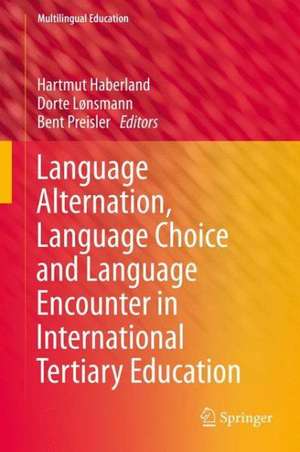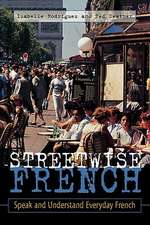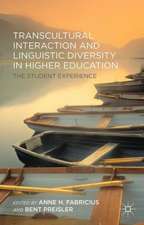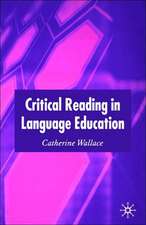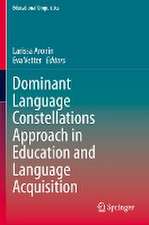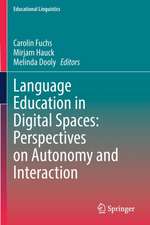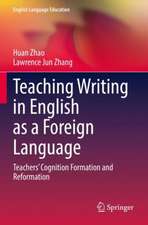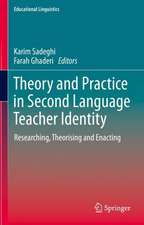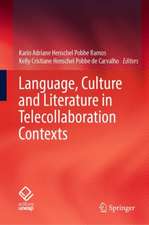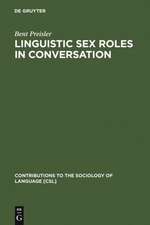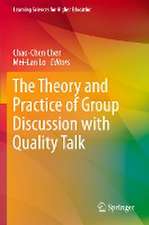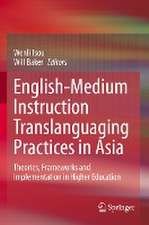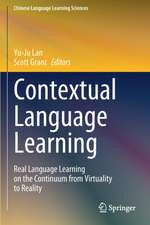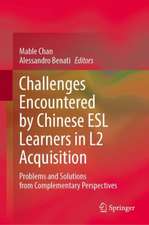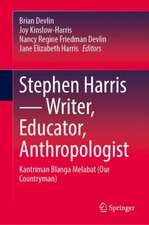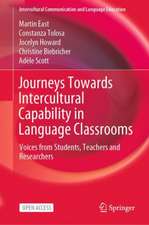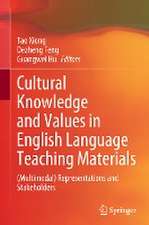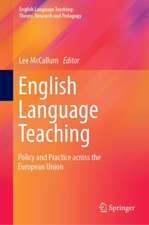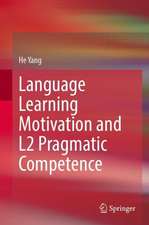Language Alternation, Language Choice and Language Encounter in International Tertiary Education: Multilingual Education, cartea 5
Editat de Hartmut Haberland, Dorte Lønsmann, Bent Preisleren Limba Engleză Hardback – 10 iul 2013
Patterns of language alternation and choice have become increasingly important to the development of an understanding of the internationalisation of higher education that is occurring world-wide. This volume draws on the extensive and varied literature related to the sociolinguistics of globalisation – linguistic ethnography, discourse analysis, language teaching, language and identity, and language planning – as the theoretical bases for the description of the nature of these emerging multilingual communities that are increasingly found in international education. It uses observational data from eleven studies that take into account the macro (societal), meso (university) and micro (participant) levels of language interaction to explicate the range of language encounters – highlighting both successful and problematic interactions and their related language ideologies. Although English is the common lingua franca, the studies in the volume highlight the importance of the multilingual resources available to participants in higher educational institutions that are used to negotiate and solve their language problems. The volume brings to our attention a range of important insights into language issues found in the internationalisation of higher education, and provides a resource for those wishing to understand or do research on how language hybridity and multilingual communicative practices are evolving there. Richard B. Baldauf Jr., Professor, The University of Queensland
| Toate formatele și edițiile | Preț | Express |
|---|---|---|
| Paperback (1) | 639.08 lei 6-8 săpt. | |
| SPRINGER NETHERLANDS – 15 iul 2015 | 639.08 lei 6-8 săpt. | |
| Hardback (1) | 645.28 lei 6-8 săpt. | |
| SPRINGER NETHERLANDS – 10 iul 2013 | 645.28 lei 6-8 săpt. |
Din seria Multilingual Education
- 18%
 Preț: 902.36 lei
Preț: 902.36 lei - 18%
 Preț: 956.81 lei
Preț: 956.81 lei - 18%
 Preț: 953.65 lei
Preț: 953.65 lei - 18%
 Preț: 836.29 lei
Preț: 836.29 lei - 15%
 Preț: 638.24 lei
Preț: 638.24 lei - 20%
 Preț: 567.32 lei
Preț: 567.32 lei - 20%
 Preț: 566.76 lei
Preț: 566.76 lei - 20%
 Preț: 569.86 lei
Preț: 569.86 lei - 15%
 Preț: 649.87 lei
Preț: 649.87 lei - 15%
 Preț: 645.28 lei
Preț: 645.28 lei -
 Preț: 394.87 lei
Preț: 394.87 lei - 15%
 Preț: 643.84 lei
Preț: 643.84 lei - 15%
 Preț: 643.34 lei
Preț: 643.34 lei -
 Preț: 389.49 lei
Preț: 389.49 lei - 15%
 Preț: 704.36 lei
Preț: 704.36 lei - 20%
 Preț: 555.53 lei
Preț: 555.53 lei - 18%
 Preț: 953.65 lei
Preț: 953.65 lei - 18%
 Preț: 952.26 lei
Preț: 952.26 lei - 15%
 Preț: 646.43 lei
Preț: 646.43 lei - 15%
 Preț: 585.40 lei
Preț: 585.40 lei - 18%
 Preț: 787.15 lei
Preț: 787.15 lei - 18%
 Preț: 1009.22 lei
Preț: 1009.22 lei - 18%
 Preț: 948.92 lei
Preț: 948.92 lei - 15%
 Preț: 649.22 lei
Preț: 649.22 lei - 18%
 Preț: 1113.39 lei
Preț: 1113.39 lei - 15%
 Preț: 644.95 lei
Preț: 644.95 lei - 15%
 Preț: 634.68 lei
Preț: 634.68 lei - 15%
 Preț: 644.63 lei
Preț: 644.63 lei -
 Preț: 388.90 lei
Preț: 388.90 lei - 15%
 Preț: 647.27 lei
Preț: 647.27 lei - 15%
 Preț: 641.85 lei
Preț: 641.85 lei - 15%
 Preț: 635.80 lei
Preț: 635.80 lei
Preț: 645.28 lei
Preț vechi: 759.15 lei
-15% Nou
Puncte Express: 968
Preț estimativ în valută:
123.49€ • 128.45$ • 101.95£
123.49€ • 128.45$ • 101.95£
Carte tipărită la comandă
Livrare economică 15-29 aprilie
Preluare comenzi: 021 569.72.76
Specificații
ISBN-13: 9789400764750
ISBN-10: 9400764758
Pagini: 230
Ilustrații: XXIV, 241 p.
Dimensiuni: 155 x 235 x 22 mm
Greutate: 0.55 kg
Ediția:2013
Editura: SPRINGER NETHERLANDS
Colecția Springer
Seria Multilingual Education
Locul publicării:Dordrecht, Netherlands
ISBN-10: 9400764758
Pagini: 230
Ilustrații: XXIV, 241 p.
Dimensiuni: 155 x 235 x 22 mm
Greutate: 0.55 kg
Ediția:2013
Editura: SPRINGER NETHERLANDS
Colecția Springer
Seria Multilingual Education
Locul publicării:Dordrecht, Netherlands
Public țintă
ResearchCuprins
Notes on contributors.- Hybridity and complexity: language choice and language ideologies.- Part I The local language as a resource in social, administrative and learning interactions. 1. Kitchen talk – Exploring linguistic practices in liminal institutional interactions in a multilingual university setting.- 2. Japanese and English as lingua francas: Language choices for international students in contemporary Japan.- 3. Plurilingual resources in lingua franca talk: An interactionist perspective.- 4. Language choice and linguistic variation in classes nominally taught in English.- 5. Active biliteracy? Students taking decisions about using languages for academic purposes.- Part II Using English as a lingua franca in teaching a foreign language. 6. English as a lingua franca: A case of Japanese courses in Australia.- 7. “Teacher! Why do you speak English?” A discussion of teacher use of English in a Danish language class.- 8. The use of English as a lingua francain teaching Chinese as a foreign language: A case study of native Chinese teachers in Beijing.- Part III Parallel language use: English and the local language. 9. Stylistic and pedagogical consequences of university teaching in English in Europe.- Part IV Language policies and language ideologies in international education. 10. Expanding language borders in a bilingual institution aiming at trilingualism.- 11. Language practices and transformation of language ideologies: Mainland Chinese students in a multilingual university in Hong Kong.
Recenzii
From the reviews:
“Each chapter offers an interesting analysis of language use and negotiation, and together, the volume presents a complete depiction of the linguistic diversity of the international university. … this volume would be quite accessible to researchers, educators, and students … . The contributions to the book are thoughtfully organized into parts, which could make this volume a good choice as a text for perhaps a seminar or other compartmentalized course.” (Cecily Brainerd Corbett, THE LINGUIST LIST, March, 2014)
“Each chapter offers an interesting analysis of language use and negotiation, and together, the volume presents a complete depiction of the linguistic diversity of the international university. … this volume would be quite accessible to researchers, educators, and students … . The contributions to the book are thoughtfully organized into parts, which could make this volume a good choice as a text for perhaps a seminar or other compartmentalized course.” (Cecily Brainerd Corbett, THE LINGUIST LIST, March, 2014)
Notă biografică
Hartmut Haberland is Professor in German Language and the Sociolinguistics of Globalization at Roskilde University, Denmark, and the leader of the research group An Ethnography of Language Encounters: Language and Interaction in the Globalized Corporation (LINGCORP). He founded the Journal of Pragmatics with Jacob Mey in 1977 and is presently co-editor of Pragmatics and Society and Acta Linguistica Hafniensia. His current research interest is in the pragmatics and sociolinguistics of multilingualism.
Dorte Lønsmann is an Assistant Professor at Copenhagen Business School and a member of the LINGCORP research group. Her research interests include English as a global language, language ideologies and language choice. She wrote her PhD thesis on the use of English as a corporate language in Danish companies and has also published on language and identity in the computer gaming subculture. She currently investigates language ideologies and social categorisation in multilingual workplaces.
Bent Preisler is Professor Emeritus of English Language and Sociolinguistics at Roskilde University, Denmark. He is the founder and former director of the international research center for the study of Cultural and Linguistic Practices in the International University (CALPIU). Research includes works on the structure and functions of English, English as an international language and its influence on other languages. Author of a book, in Danish, on “The Danes and the English language” (1999).
Dorte Lønsmann is an Assistant Professor at Copenhagen Business School and a member of the LINGCORP research group. Her research interests include English as a global language, language ideologies and language choice. She wrote her PhD thesis on the use of English as a corporate language in Danish companies and has also published on language and identity in the computer gaming subculture. She currently investigates language ideologies and social categorisation in multilingual workplaces.
Bent Preisler is Professor Emeritus of English Language and Sociolinguistics at Roskilde University, Denmark. He is the founder and former director of the international research center for the study of Cultural and Linguistic Practices in the International University (CALPIU). Research includes works on the structure and functions of English, English as an international language and its influence on other languages. Author of a book, in Danish, on “The Danes and the English language” (1999).
Textul de pe ultima copertă
Reflecting the increased use of English as lingua franca in today’s university education, this volume maps the interplay and competition between English and other tongues in a learning community that in practice is not only bilingual but multilingual. The volume includes case studies from Japan, Australia, South Africa, Germany, Catalonia, China, Denmark and Sweden, analysing a range of issues such as the conflict between the students’ native languages and English, the reality of parallel teaching in English as well as in the local language, and classrooms that are nominally English-speaking but multilingual in practice. The book assesses the factors common to successful bilingual learners, and provides university administrators, policy makers and teachers around the world with a much-needed commentary on the challenges they face in increasingly multilingual surroundings characterized by a heterogeneous student population.
Patterns of language alternation and choice have become increasingly important to the development of an understanding of the internationalisation of higher education that is occurring world-wide. This volume draws on the extensive and varied literature related to the sociolinguistics of globalisation – linguistic ethnography, discourse analysis, language teaching, language and identity, and language planning – as the theoretical bases for the description of the nature of these emerging multilingual communities that are increasingly found in international education. It uses observational data from eleven studies that take into account the macro (societal), meso (university) and micro (participant) levels of language interaction to explicate the range of language encounters – highlighting both successful and problematic interactions and their related language ideologies. Although English is the common lingua franca, the studies in the volume highlight the importance of the multilingual resources available to participants in higher educational institutions that are used to negotiate and solve their language problems. The volume brings to our attention a range of important insights into language issues found in the internationalisation of higher education, and provides a resource for those wishing to understand or do research on how language hybridity and multilingual communicative practices are evolving there. Richard B. Baldauf Jr., Professor, The University of Queensland
Patterns of language alternation and choice have become increasingly important to the development of an understanding of the internationalisation of higher education that is occurring world-wide. This volume draws on the extensive and varied literature related to the sociolinguistics of globalisation – linguistic ethnography, discourse analysis, language teaching, language and identity, and language planning – as the theoretical bases for the description of the nature of these emerging multilingual communities that are increasingly found in international education. It uses observational data from eleven studies that take into account the macro (societal), meso (university) and micro (participant) levels of language interaction to explicate the range of language encounters – highlighting both successful and problematic interactions and their related language ideologies. Although English is the common lingua franca, the studies in the volume highlight the importance of the multilingual resources available to participants in higher educational institutions that are used to negotiate and solve their language problems. The volume brings to our attention a range of important insights into language issues found in the internationalisation of higher education, and provides a resource for those wishing to understand or do research on how language hybridity and multilingual communicative practices are evolving there. Richard B. Baldauf Jr., Professor, The University of Queensland
Caracteristici
Addresses the multilingual reality of the university in a global age Focuses not only on the role of English as a lingua franca, but on the interplay between English and other languages Brings together cases from countries in Europe, Africa, Asia, and Australia Includes supplementary material: sn.pub/extras
